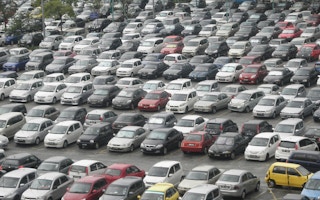“If you want to be a country of peasants, planting rice and catching fish, okay, we’ll do that for you.”
To continue reading, subscribe to Eco‑Business.
There's something for everyone. We offer a range of subscription plans.
- Access our stories and receive our Insights Weekly newsletter with the free EB Member plan.
- Unlock unlimited access to our content and archive with EB Circle.
- Publish your content with EB Premium.
This is what Malaysian Prime Minister Mahathir Mohamad had to say, rather acerbically, in reaction to the poor reception from the public over his proposal to develop a third national car. The Prime Minister, who came into office this year after the Pakatan Harapan coalition won Malaysia’s 14th general election, reasoned that another local car manufacturer will bring Malaysia back to its heyday of automotive manufacturing while advancing development, spurring technical capabilities and boosting exports.
Mahathir also said that the people can also forget about Wawasan 2020, Malaysia’s vision of becoming a developed nation by the end of the decade, which was first introduced in the early 1990s. But it’s now 2018 and time to look at development through a more sustainable lens.
The rejection of the idea by the people of Malaysia is valid. Some of the reasons for this relate to road congestion and the reduced incentive to improve public transportation, but the environmental consequences cannot be ignored. To put it quite simply, another national car project would promote development around a carbon-intensive, fossil fuel-consuming industry that sets the country back on its commitments to unconditionally reduce greenhouse gas emissions intensity of GDP by 35 per cent by 2030, relative to 2005 levels. To make matters worse, in the months since the election, the government has either suspended or cancelled several proposed large-scale mass transit projects such as MRT3, East Coast Rail Line and the Kuala Lumpur–Singapore high-speed rail project.
To advance Malaysia’s development without adversely harming the environment in which we live, 20th century practices is not the way forward.
Instead, let’s invest our resources in industries that will stimulate the country’s green economy. Ahead of countries like Japan, Malaysia is the third-largest producer of solar photovoltaics in the world, asserting its credibility and potential of being a regional and global leader in the green energy space. We have the technology and expertise already in Malaysia—we should be looking at how we can nurture and expand it.
If we are considering ways to bolster the transportation sector, let’s look at cultivating talent and manufacturing capabilities in rail transport locally. Malaysia currently contracts companies from countries like Germany, the US, China, and Japan when improving our rail infrastructure.
If we foster a local rail manufacturing industry, we train our people and we build our technological capabilities around a cleaner mode of transportation for local implementation and for export. In the coming decades, our neighbours around Southeast Asia will look to implement sustainable transportation networks. Malaysia needs to be in a position to build the infrastructure for the region.
A national EV project?
But what if the next national car project incorporates electric vehicles (EVs)? While Mahathir has not mentioned this publicly, it is a possibility. Rumours have been ripe and recently, Water, Land and Natural Resources Minister Dr A. Xavier Jayakumar has suggested that the new national car project should look at making EVs the core of its business.
Electrification of private transportation is absolutely the way forward. However, Malaysia simply is not ready for the adoption of EVs.
Battery technology has not reached a level where it is easy and affordable to produce and maintain batteries for EVs. Starting an EV company in Malaysia would be incomplete without building vast networks of charging stations around the country, which would take more time and investment. Not to mention, batteries require raw materials such as lithium, cobalt, and nickel that have to be mined—often in ways detrimental to the environment.
More importantly, electrifying our vehicles now would only shift our carbon emissions from the transportation sector to the energy production sector. With coal providing more than half of our energy, the electricity that powers EVs are effectively cancelling out the vehicle’s ability to be a green mode of private transportation.
“
Moving a whole population away from car-dependence will be a necessary, though long and arduous, process.
In fact, the Penang Institute recently published a paper disproving the perception that EVs in Malaysia are cleaner than conventional internal-combustion engine vehicles (ICEV). EVs in Malaysia on average achieve a fuel economy equivalent to an ICEV of just 15.8km/L. For comparison, the Perodua Bezza, achieves a fuel economy of 21km/L.
To put it simply, it’s cleaner to drive a Perodua Bezza than a Tesla in Malaysia. Although counter-intuitive, EVs are currently dirtier vehicles in Malaysia as a result of our atrocious renewable-to-fossil fuel energy mix. According to Malaysia’s Energy Commission (EC), as of 2018, 57 per cent of electricity in the Peninsula is generated from the burning of coal, and 35 per cent from natural gas. The remaining 8 per cent represents renewable and hydroelectric energy, which is not considered renewable in Malaysia due to its environmental impact.
So EV or not, a third national car constitutes a project that will promote the burning of fossil fuels. That is why moving a whole population away from car-dependence will be a necessary, though long and arduous, process. It starts with bolstering our public transportation since it fundamentally emits less carbon per passenger than private transportation. Malaysia needs to refocus its attention and resources to developing and upgrading our network of trains and buses, so they become easy to access and convenient to use.
Another measure we need to take is to drastically increase our electricity generation from renewable sources, while driving down the percentage of fossil fuel in the national energy mix, namely coal. This falls squarely in line with the newly installed Pakatan Harapan government’s intention to increase renewable energy generation from a measly 2 per cent to 20 per cent by the year 2025.
In a time of renewed hope and direction for Malaysia, we cannot fall back on development strategies that may have worked in the last century. Climate change is already affecting people’s lives and will only get worse in the near future. Investing in sustainable methods of transportation and clean energy generation are the first steps to developing Malaysia in a responsible manner.
Mike Campton is Assistant Manager at Malaysian Youth Delegation.











